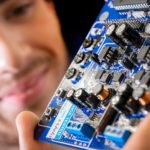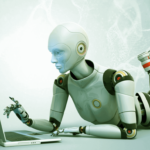IoT is the technology of today which is touching and transforming the every aspect of our real life. IOT has given a concept of Machine to-Machine (M2M) communication. If we talk about IOT applications in an organized manner, these are broadly divided into Industrial and Consumer segments. The industrial segment covers industrial and retail automation which largely contributes to the development of smart cities. On the other hand, the consumer segment is mainly driven by personal interest and covers smart lifestyle, home, health & fitness automation. Likewise, enterprises and consumers using IOT solutions will be complementing the IOT growth in our country.Companies like Microsoft and SAP are implementing strategy to capitalize on the Internet of Things.
According to NASSCOM, the global market size of IOT is expected to touch USD 3 trillion by 2020. In this landscape, startups are playing the biggest role in enabling IOT services in the consumer as well as the industrial segment. In India, there are more than 60 percent start-ups working on the lines of IOT with their highly technical and technological skills.
IOT proves to have a huge scope as it provides a unique opportunity for businesses to turn data into insights. There are a number of contributing factors as well that drive the adoption of IOT such as improved sensors, device connections, the evolution of lifestyle and mobility. These factors alone will drive the adoption of IOT in India. By 2020, India’s IOT market is expected to reach by USD 15 billion as per NASSCOM’s report. To provide an improved internet experience, many companies and start-ups have emerged as big players in the IOT market. In India, nearly 120 companies and 70 % start-ups are offering IOT enabled solutions. From 2015 till now, around 60 USD million has been invested in IOT which has given birth to a new way of working and living. To hunt for IoT jobs, the baseline knowledge one should have include the following:
Available Career Options
Job profile of an IoT techie involves implementing codes, data extraction, modeling of extracted data, managing files over the network, server management, management of VPNs and many more elements before finally creating an application. IoT job market offers great opportunities for programmers, engineers and designers, specially in the fields like Information Security; Healthcare; Industrial automation; Home Automation; UI/ UX Design; Traffic Control; Environment monitoring and so on.
IoT has opened array of opportunities and some among the highest paying and most sought after job titles in IoT include :
These are the professionals who keep an eye on the execution part of the project. Their job roles vary from development, to marketing to various routes to market. They also collaborate with the development teams to take care of business requirements and implementations.
An IoT system is a complicated mesh of connected gadgets and objects that has to be properly planned before implementation with the network specialisation. IoT architects key role is to convert ideas into design and design into functional code. An IoT architect might not be the actual developer, but is the one who takes up a requirement and then converts them into a blueprint. So what they actually do is map business needs to system and technical requirements.
IoT Developers are professionals who gets down to the basic and creates the actual code. They take care of the whole software part of the IoT stack.
One of the key features of an IoT system is the amount of data generated. Data Scientists are those who have hands-on experience working with sensor data. They are in high demand within the IoT industry, with expertise in both structured and unstructured data. Big data expertise and experience would be a strong factor in getting opportunities in this segment.
The responsibility of robot coordinator will be to supervise the bots on the shop floor and counter any breakdowns or miscalculation. This professional executes both repetitive and disaster recovery duties.
The candidate will be able to establish & deploy the middleware and NoSQL database for collecting data from the IoT devices in the network.
The role of industrial engineers is to look into the hardware part of IoT. Hardware is the chief component of the IoT stack. The industrial engineer professionals program robots and smart devices.
The top of the IoT stack is dashboards or visual screens that end users look at. These are interfaces that are either used to control the sensors or to examine the data coming out of it. UI/UX designer is the integral part of the IoT professional ecosystem. They would take requirements on the end dashboard and would actually go on to design them.
Other Job profiles in IoT are :
❏ Designer: CAD Designer who can design a IoT consumer device such as a Wearable.
❏ Material specialist: Need to have an understanding of material to be used which can embed a sensor within. Key for material selection
❏ Embedded Engineer: Who can program the electronic component which is part of the IoT Device
❏ Network Engineer : Who can decide and help establish a Fog Computing network or choose the right gateway etc.,
❏ Data Visualization expert: Who will be able to provide a visual feel of the data as the final outcome to make business insight.
❏ Programmer:Would develop back-end and integrate with the middle ware, cloud databases, etc.,
❏ Test engineers: Who will be able to test the functional aspects of the IoT devices and its integrated application test scenarios.
❏ Instrumentation Engineers: Who will be able to handle actuators, sensors for closed loop systems.


